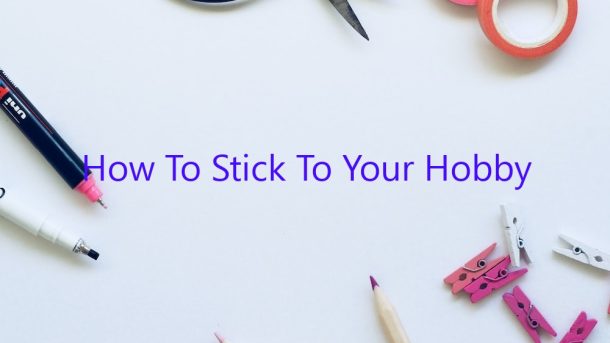We all have hobbies that we love, but sometimes it’s hard to stick to them. Maybe you’ve been too busy, or life has gotten in the way. Here are a few tips on how to stick to your hobby.
Find time for your hobby.
The easiest way to stick to your hobby is to find time for it. Block out time on your calendar each week to dedicate to your hobby. This will help you to make it a priority and ensure that you have enough time to enjoy it.
Set realistic goals.
It’s important to set realistic goals for your hobby. If you’re trying to do too much, you’ll quickly become overwhelmed and be less likely to stick to it. Start by setting small goals and gradually increase them as you become more comfortable.
Find a hobby buddy.
It can be helpful to find someone else who shares your hobby. This can make it more enjoyable and help you to stick to it. You can swap tips, trade equipment, and just generally support each other.
Make it a priority.
If you want to stick to your hobby, you need to make it a priority. Put it ahead of other things that may be competing for your time. This may mean turning down invitations or rearranging your schedule. But in the end, it will be worth it.
Get organized.
Having a well-organized hobby area can help you to stick to your hobby. Everything you need should be easy to find and within reach. This will help you to avoid wasting time looking for things and maximize your productivity.
Set boundaries.
If you have trouble sticking to your hobby, it may be because you’re not setting boundaries. Make sure you have a cutoff time each day and stick to it. This will help you to maintain balance in your life and ensure that your hobby doesn’t take over.
Be patient.
Don’t expect to become an expert overnight. It takes time and practice to improve your skills. Be patient and keep at it. You’ll get better over time.
Contents [hide]
How do you stay committed to a hobby?
A hobby can be a great way to pass the time, express yourself, and connect with others. However, it can be difficult to stay committed to a hobby. There are a few things you can do to help you stay on track.
One thing that can help is to set goals for yourself. When you have a goal in mind, it can be easier to stay motivated. For example, if you want to learn how to knit, set a goal to knit a certain number of hats or scarves.
Another thing that can help is to find a hobby group. When you have others to do the hobby with, it can be more fun and you’ll be less likely to quit. You can find groups online or in your local community.
Finally, don’t be afraid to try new things. If you’re bored with your current hobby, try something new. There are many different hobbies out there, so you’re sure to find one that you’ll enjoy.
How do you stop a hobby from jumping?
How do you stop a hobby from jumping?
It can be difficult to keep a hobby from becoming an addiction, especially if the hobby is something that provides an adrenaline rush. There are a few things that you can do to try to keep your hobby from jumping to the next level.
First, you need to set some limits for yourself. If you know that you are susceptible to addiction, set limits on how much time you spend on your hobby each day or week. Also, set limits on how much money you are willing to spend on your hobby.
Second, try to find a hobby that is not as addictive. There are many hobbies that can provide an adrenaline rush without being as addictive as other hobbies. Try surfing, rock climbing, or snowboarding.
Third, find a hobby that is more social. Hobbies that are more social are less likely to become addictive because they provide more of a sense of community and camaraderie. Try joining a club or a group that shares your hobby. This will help you to stay accountable and keep your hobby from becoming an addiction.
How long does it take for a hobby to stick?
How long it takes for a hobby to stick varies from person to person. For some, it might take a few weeks or months, while for others it might take years. There are many factors that contribute to whether or not a hobby will stick, such as how much time and effort you put into it, how much you enjoy it, and how easily you can find time for it.
There are a few things you can do to increase the chances of your hobby sticking. First, try to find a hobby that you really enjoy. If you enjoy what you’re doing, you’re more likely to stick with it. Additionally, try to find a hobby that you can do in your spare time. If you can easily fit it into your schedule, you’re more likely to stick with it. Finally, be patient. It may take a while for your hobby to stick, but if you keep at it, you’re sure to find something that you love.
How do I find a sick hobby?
Finding a sick hobby can be a fun and rewarding experience, but it can be difficult to know where to start. Here are a few tips to help you get started.
One thing to keep in mind is that not every hobby is right for everyone. Some people may enjoy skydiving or rock climbing, while others may prefer more relaxing activities like gardening or bird watching. It’s important to find a hobby that you enjoy and that fits your personality.
Another thing to consider is your budget. Some hobbies can be expensive, while others are more affordable. It’s important to find a hobby that you can afford without breaking the bank.
Finally, it’s important to find a hobby that’s safe. Some hobbies can be dangerous, so it’s important to do your research before choosing one.
If you’re looking for a sick hobby, here are a few ideas to get you started:
1. Hiking – Hiking can be a great way to get exercise and explore new areas.
2. Bird watching – Bird watching is a relaxing and enjoyable hobby.
3. Gardening – Gardening is a great way to get outdoors and learn about plants and flowers.
4. Photography – Photography is a fun and affordable hobby.
5. Knitting – Knitting is a relaxing and rewarding hobby.
6. Model building – Model building can be a fun way to spend a rainy day.
7. Scrapbooking – Scrapbooking is a fun way to preserve memories.
8. Coin collecting – Coin collecting is a fun and educational hobby.
9. Playing instruments – Playing instruments can be a fun way to express yourself.
10. Collecting stamps – Collecting stamps is a fun and affordable hobby.
Why am I not motivated for my hobbies?
It’s natural to feel unmotivated for your hobbies at times. After all, hobbies are supposed to be enjoyable, not stressful. However, if you find yourself constantly unmotivated for your hobbies, it may be time to take a look at the reasons why.
One possible reason for your lack of motivation may be that you’re simply not enjoying your hobby as much as you used to. This is common, especially if your hobby has become more of a chore than a pastime. If this is the case, it might be time to find a new hobby that you’re more passionate about.
Another possible reason for your lack of motivation may be that you’re feeling overwhelmed. This is especially common if your hobby involves a lot of new skills or techniques. In this case, it might be helpful to break down the task into smaller, more manageable steps.
Finally, it’s also possible that you’re simply not feeling good about yourself. If you’re dealing with a lot of stress or anxiety, it can be difficult to focus on anything else. In this case, it’s important to find ways to manage your stress and anxiety. Once you’re feeling better, you’ll likely find that you’re more motivated to participate in your hobbies.
Why can’t I fully commit to anything?
Do you find yourself constantly struggling to commit to anything? Do you feel like you can never fully devote yourself to anything? If so, you’re not alone. Many people find it difficult to commit to anything, for a variety of reasons. Here are some of the most common reasons why people find it hard to commit:
1. Fear of failure
Many people find it hard to commit to anything because they’re afraid of failure. They’re afraid that if they commit to something, they might not be able to achieve it and they’ll end up disappointing themselves. This fear can keep people from committing to anything, including relationships, jobs, and goals.
2. Fear of change
People can also find it hard to commit to anything because they’re afraid of change. They may be comfortable with the way things are and they’re afraid that if they make a change, it will be for the worse. This fear can keep people from committing to new relationships, jobs, or opportunities.
3. Lack of confidence
People who lack confidence often find it hard to commit to anything. They may not feel like they’re good enough or they may be afraid of taking risks. This can keep them from committing to new relationships, jobs, or opportunities.
4. Lack of time
Many people find it hard to commit to anything because they don’t have enough time. They may be too busy with their current commitments to add anything else to their plate. This can keep people from committing to new relationships, jobs, or opportunities.
5. Fear of change
People can also find it hard to commit to anything because they’re afraid of change. They may be comfortable with the way things are and they’re afraid that if they make a change, it will be for the worse. This fear can keep people from committing to new relationships, jobs, or opportunities.
6. Lack of interest
People may also find it hard to commit to anything because they’re not interested in it. If they’re not passionate about it, they’re not likely to put in the effort necessary to make it work. This can keep people from committing to new relationships, jobs, or opportunities.
7. Bad experiences
People may also find it hard to commit to anything because they’ve had bad experiences in the past. They may have been hurt in the past by someone they were committed to and they’re afraid of getting hurt again. This can keep people from committing to new relationships, jobs, or opportunities.
8. Fear of commitment
Lastly, people may find it hard to commit to anything because they’re afraid of commitment. They may feel like they’re giving up too much by committing to something and they’re afraid of what might happen if things don’t work out. This can keep people from committing to new relationships, jobs, or opportunities.
If you’re finding it hard to commit to anything, it’s important to understand why that is. Once you know the reason, you can work on addressing it and making it easier for yourself to commit. If you’re afraid of failure, for example, you can work on building up your confidence. If you’re afraid of change, you can work on becoming more open to it. If you’re not interested in something, you can work on finding a way to make it more appealing to you.
The bottom line is that if you want to commit to something, you can find a way to make it happen. It may take some effort, but it’s worth it in the end. So don’t be afraid to commit to something that’s important to you. The more you commit
Do ADHD people have hobbies?
There is no single answer to the question of whether people with ADHD have hobbies, as the answer may depend on the individual. However, many people with ADHD do enjoy spending their time participating in activities that are fun and engaging.
Some common hobbies that people with ADHD may enjoy include playing sports, participating in arts and crafts, playing music, and engaging in outdoor activities. These activities can help to provide a sense of satisfaction and enjoyment, as well as a sense of accomplishment.
It is important to find hobbies that are enjoyable and that offer a sense of challenge, as people with ADHD can often become easily bored. This is why it is important to find activities that offer a level of stimulation that is appealing.
If you are unsure of what hobbies might be a good fit for you, it may be helpful to ask friends and family for suggestions. You can also do some research online to find activities that sound appealing.
It is also important to find a hobby that you can stick with, as it can be difficult to stick with something if it is not enjoyable. So, it is important to find something that you will enjoy and that will keep you engaged.
Ultimately, the best way to find out if a particular hobby is a good fit for you is to try it out. If it is not enjoyable, or if you find that you are struggling to stick with it, then it may not be the right hobby for you. However, if you find that you enjoy it and it is a good fit for you, then you may want to consider making it a regular part of your routine.




